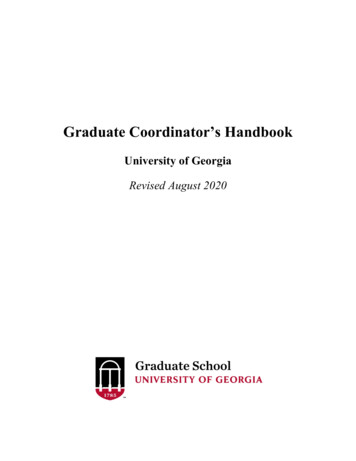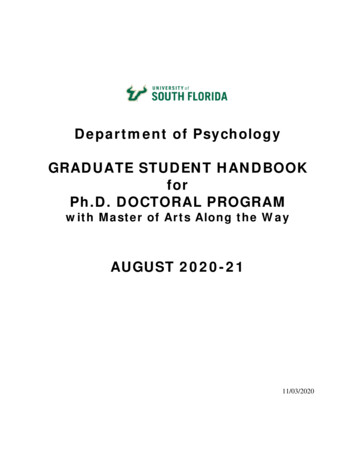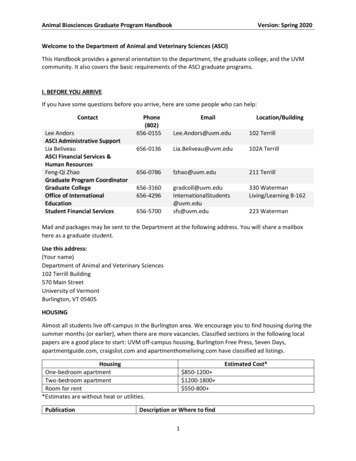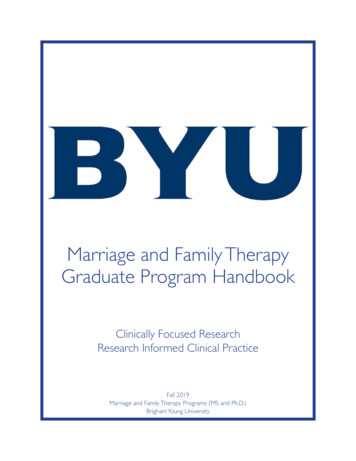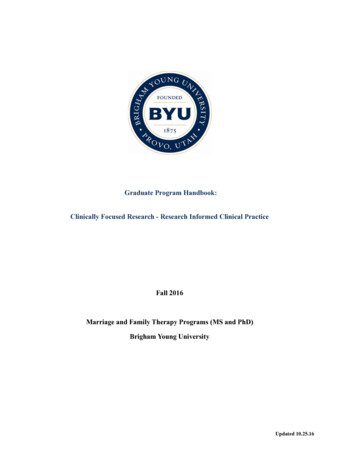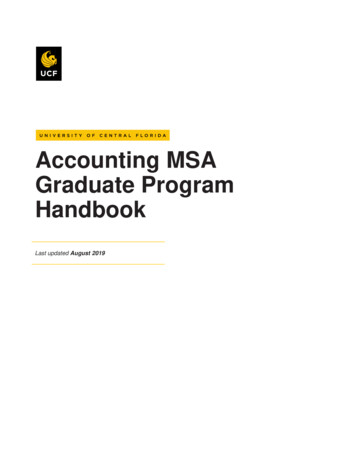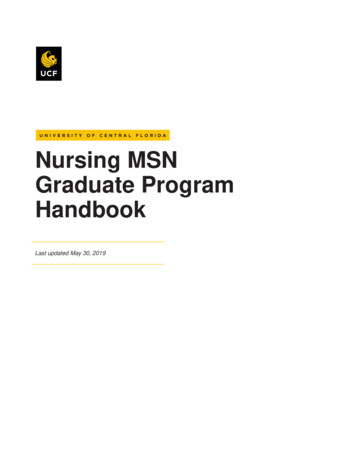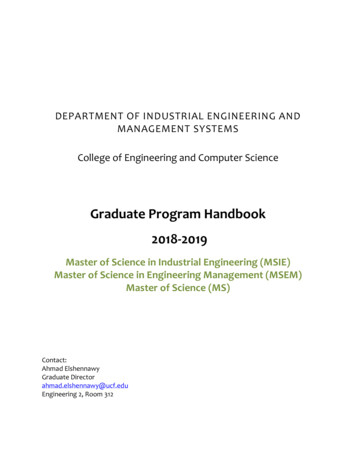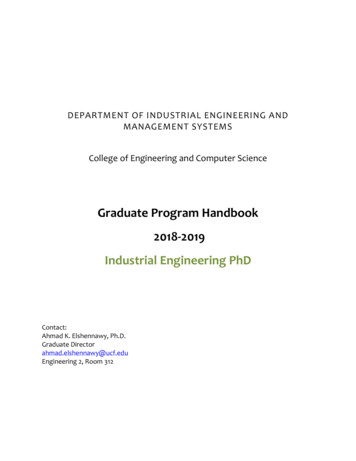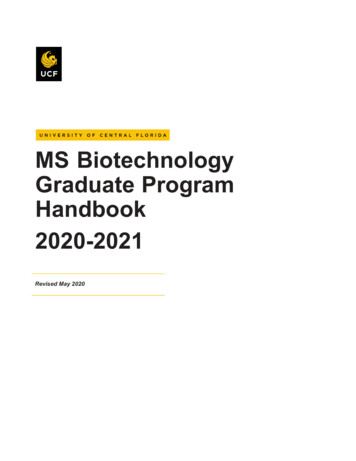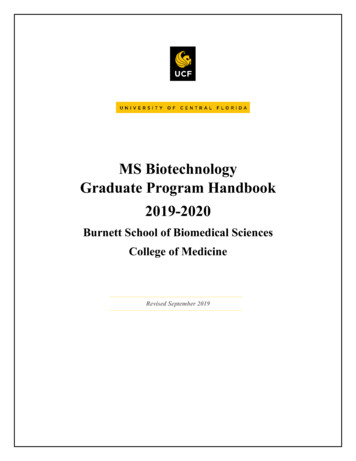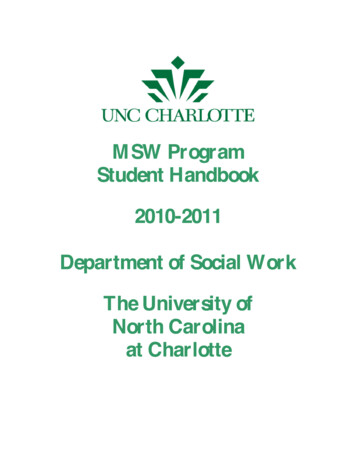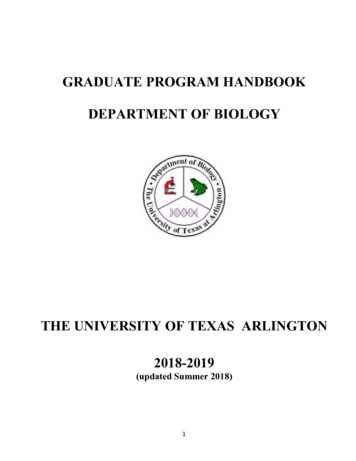
Transcription
GRADUATE PROGRAM HANDBOOKDEPARTMENT OF BIOLOGYTHE UNIVERSITY OF TEXAS ARLINGTON2018-2019(updated Summer 2018)1
TABLE OF CONTENTSSectionPageA. OVERVIEW OF THE GRADUATE PROGRAM3B. DEPARTMENT & UNIVERSITY GRADUATE PROGRAM POLICIESUT Arlington Office of Admissions, Records and Registration PoliciesMaster's ProgramDoctoral ProgramMiscellaneous4461015C. TEACHING ASSISTANTSHIPS & FINANCIAL AID17D. GRADUATE STUDENT ORGANIZATION, ACTIVITIES & AWARDSPhi Sigma SocietyFunding Opportunities for Graduate StudentsGraduate Student Awards20202022E. BIOLOGY DEPARTMENT24F. HOUSING AND THE METROPLEX AREA25G. APPENDICESGraduate Student Termination PolicySteps Required To Earn a Master’s DegreeStudent/Advisor Checklist—Master of Science Degree in Biology (non-thesis)Student/Advisor Checklist—Master of Science Degree in Biology (thesis)Steps Required to Earn a Doctoral DegreePh.D. Student C.V. and EvaluationWritten Portion of Qualifying Exam: Grant Instructions and Guidelines26272829293031322
A. OVERVIEW OF THE GRADUATE PROGRAMThe goal of the graduate program is the development of the graduate student’s abilities for creative scientificresearch, analytical evaluation, and scholarship in various subdisciplines of the biological sciences. TheDepartment of Biology at the University of Texas Arlington (UT Arlington) offers the Master of Science degreein biology (both thesis and non-thesis options) and the Doctor of Philosophy degree in Quantitative Biology.The Department provides an active research environment for graduate students in the major research areas ofecology and evolution, genome biology, microbiology, and molecular biology.The non-thesis master’s (MSNT) program is an adaptable degree program that involves the completion ofadvanced courses of interest to the student. The student can also take lab technique/problem courses. Thedegree, however, is not research-centric. The MSNT program is very useful for those wishing to better positionthemselves for medical, dental, or veterinary school. The MSNT program is also sought after by business,industry, government, and teaching professionals wishing to enter or enhance their careers through an advanceddegree in biology. MSNT students are not eligible for graduate teaching assistantships (GTA) or graduateresearch assistantships (GRA), but they are eligible for other campus, state, or federal assistantships, loans, orstudent job programs. Please visit on%20Completion%20Resources/Funding/FundingTOC.php for more information on funding your graduate studies.The Master’s Thesis (MST) and Doctoral (B.S,/M.S,-Ph.D.) programs are our research degree programs. If anMSNT student wishes to switch to the MST program or the Ph.D. program prior to arrival, or early in his/hercareer, the student must obtain the consent of one of our research faculty (in order to join that faculty member’sresearch team), the graduate advisor, and the Graduate Advisory Committee. Please note that we accept only afew MST students. If you are interested in research, please consider applying for our doctoral program inquantitative biology instead of the MST program. A student can enter the doctoral program directly (i.e., withonly a prior bachelor’s degree). MST and Ph.D. students are eligible for graduate teaching assistantships (GTA)and graduate research assistantships (GRA), although doctoral students are given preference.The Doctoral Program in Quantitative Biology is our primary research degree program and is research-centric.A student can enter the doctoral program after having achieved either a prior bachelor’s degree or a priormaster’s degree. The student will join one of our research faculty’s labs for his/her dissertation work. Ourfaculty are engaged a broad range of research topics and approaches including ecology and evolution, genomebiology (“omics”), microbiology, or molecular biology. Students are provided with the resources they need tosucceed in their graduate program through mentoring by faculty, access to state-of-the-art laboratories, andoutstanding courses. Graduates of this program are uniquely trained and should have a competitive advantagefor careers in academia, industry, or government.3
B. DEPARTMENT AND UNIVERSITY GRADUATE PROGRAM POLICIESDepartment and University CommunicationUpon arrival to campus, students will be assigned a UT Arlington e-mail account after contacting the BiologyDepartment office. This account is the official means of communication by the university and the department.You must check this account regularly to ensure you receive pertinent information in a timely manner. If youhave been sent a message indicating a particular deadline and have neglected to act on that deadline, it is yourresponsibility to correct the problem.UT Arlington Graduate Studies PoliciesThe Office of Graduate Studies, in conjunction with the Office of Admissions, Records, and Registration, setsthe general requirements and procedures for graduate study at The University of Texas Arlington, and the Officeof Admissions and Records and Registration certifies and awards graduate degrees. Each student shouldfamiliarize him/herself with the information on the Office of Graduate Studies and the Office of Admissions,Records, and Registration webpages, particularly as graduation approaches. The responsibility for meetingdeadlines and filing paperwork on time resides with the student.1. The Graduate Catalog details the official policies and should be consulted by all students whenquestions arise.2. Deadlines pertinent to student progress through the graduate program are established by theOffice of Graduate Studies and the Office of Admissions, Records, and Registration and arepublished online. As students approach graduation, they should consult these webpages and theGraduate Advisor to ensure all deadlines are met.3. Most major milestones require a hard copy form be filled out by the student, signed by thestudent’s Supervisory Committee and the Graduate Advisor, and sent to the Graduate Advisoror in some instances to the Office of Admissions, Records, and Registration. The student isresponsible for obtaining the necessary paperwork through the Office of Graduate Studies es/index.php. Before sending any paperwork tothe Graduate Advisor or the Office of Admissions, Records, and Registration, make a copy foryourself and for the department (and give to Gloria Burlingham to place in your departmentalfile). Office of Admissions, Records, and Registration deadlines are final at 5:00 p.m. on thedate specified; all transactions relating to the subject of the deadline must be completed anddocumentation received in the Office of Admissions, Records, and Registration by that time.Admission Into the Graduate ProgramThe following are minimal requirements for entrance into the graduate program in Biology. Please also read theuniversity rules and regulations (http://catalog.uta.edu/science/biology/). Satisfying or exceeding the biologyand university requirements does not guarantee admission to the biology program. Admission to the program isdetermined solely by the Biology Graduate Studies Committee and the Office of Admissions, Records, andRegistration. Admission is based on an evaluation of all pertinent aspects of an applicant's record. Students areadmitted on a competitive basis subject to space and needs of the biology department. Please see the Master’sand the Doctoral sections of the Biology Handbook for greater detail.General RequirementsTo enter the Graduate Program in Biology individuals must have completed, minimally, a bachelor's degreefrom an accredited college or university. In addition, individuals must have: (a) maintained an acceptable gradepoint average at previously attended institutions; (b) presented acceptable and current scores on the aptitudeportion of the Graduate Record Examination (GRE); and (c) demonstrated through previous academicperformance the potential for graduate work. Transcripts of individuals holding a degree from an internationalcollege or university (a college or university outside the United States) are evaluated by The Office of4
Admissions, Records, and Registration for "equivalency of degrees"; if it is determined that an individual'sdegree is not equivalent to a bachelor's degree as granted by a U.S. institution, the individual must completeadditional course work before admission can be considered. International students or permanent residentsholding a degree from a university or college outside the United States must demonstrate proficiency in spokenEnglish as required by the Office of Admissions, Records, and Registration. International students or permanentresidents holding a degree from a US institution are exempt from the English proficiency requirement (but seesection on Teaching Assistantships). Individuals holding a degree in a field other than biology must havecompleted a minimum of 12 semester hours of advanced undergraduate course work (usually junior or seniorlevel courses) in biology to qualify for admission. Three letters of recommendation are required for eachapplicant. See the “How to Apply” sections for each degree on the Biology Department webpage for moredetails ntinuation in the ProgramAfter admission into the program, the student must:(a)(b)establish and maintain academic good standing. A student is considered to be in academic goodstanding if (i) a grade point average of 3.0 on all work undertaken as a graduate student ismaintained and (ii) any admission conditions are resolved within the time required.make satisfactory progress towards completion of the degree as judged by the supervisingprofessor and/or thesupervisory committee.If a graduate student fails to maintain an overall 3.0 grade point average in the first six hours of graduate coursework, the student will be placed on academic probation. The student's record will be evaluated at the completionof each semester while on probation. Failure to establish an overall grade point average of 3.0 upon completionof the first 12 hours of graduate course work will result in automatic dismissal from the program. If a student'soverall grade point-average falls below 3.0 at any time after completion of the first 12 hours of course work, thestudent will be placed on academic probation; the overall grade point average must be raised to 3.0 at the end ofthe subsequent semester or the student will be dismissed.If, at any time, a student's progress toward completion of degree requirements is judged to be unsatisfactory bythe supervising professor and/or the supervisory committee, the student will be advised of his/her failure toprogress. If at the end of the semester following such advisement, the supervising professor and/or thesupervisory committee finds that the student's progress toward completion of degree requirements remainsunsatisfactory, the student will be dismissed from the program. (See “Graduate Student Termination Policy” inAppendix.)Conducting ResearchGraduate students must get adequate training before performing any research in the laboratories. In manyinstances adequate protocols for work in the laboratories might be submitted and approved before conductingthe research. All graduate students must check the webpage of the Office of Regulatory n/departments/rs/index.php) for general information about how toconduct research, as well as any training or forms that pertain to the research they are planning to conduct.5
MASTER'S PROGRAMAdmission into the Master's ProgramIn addition to the general requirements, individuals must present an acceptable score on the GRE. Successfulmaster’s students in Biology generally have a minimum combined score of 296 on the Verbal and Quantitativesections of the exam, with a strong performance on the Quantitative section. Also, individuals must havemaintained a grade point average of 3.0 or better (on a 4.0 scale) for the last 60 hours of undergraduate work.Options, Time Limit, and ResidenceThe non-thesis master’s (MSNT) program is an adaptable degree program that involves completion of advancedcourses of interest to the student. The student can also take lab technique/problem courses. The degree, however,is not research-centric. The MSNT program is very useful for those wishing to better position themselves formedical, dental, or veterinary school. The MSNT program is also sought after by business, industry,government, and teaching professionals wishing to enter or enhance their careers through an advanced degree inbiology. The MSNT degree can be pursued as a full-time or as a part-time student.The Master’s Thesis (MST) program is a research degree program. Students intending to pursue MST must havereceived permission to join a faculty member’s research group prior to applying. Students will not be allowedinto the MST program without having joined, or having the permission to join, a faculty member’s lab. Studentsin the MST program are usually full-time students and take about two and one-half to three years to completethe program. Students may switch from the MSNT to the MST program with the consent of the BiologyGraduate Studies Committee and of the professor whose lab the student will join ; students interested in such achange must first consult with the lab professor and then the Graduate Advisor(s). Availability for switchingprograms is limited, and not all faculty take on Master's students. Do not count on being able to make theswitch! If you are interested in research, please consider applying for our doctoral program, Ph.D. in quantitativebiology, instead of the MST program. A student can enter the doctoral program directly (i.e., with only a priorbachelor’s degree).All requirements for the master's degree must be completed within six years (military service excepted) frominitial enrollment. Master's degree students are expected to spend the equivalent of two semesters of full-timestudy in residence at UT Arlington.Course Work Outside of BiologyMSNT/MST students may take up to but no more than six hours of their graduate course work in areas otherthan Biology (e.g., Geographic Information Systems, Biochemistry). Students should discuss such course workwith their advisors to ensure that it is appropriate.Course Work at the 3000 and 4000 LevelsMSNT/MST graduate students may take up to nine hours of courses at the 3000 or 4000 level, subject toapproval by the Graduate Advisor and following the UTA catalog guidelines.FundingMSNT students are not eligible for graduate teaching assistantships (GTA) or graduate research assistantships(GRA), but they are eligible for other campus, state, or federal assistantships, loans, or UTA student jobprograms. MST and Ph.D. students are eligible for graduate teaching assistantships (GTA) and graduateresearch assistantships (GRA), although doctoral students are given preference. Please C.php6
for more information on funding your graduate studies.Non-thesis optionThe non-thesis option requires completion of 36 hours of course work, including two hours of Biology 5101[Current Topics] and sufficient additional hours to meet degree requirements. Students in the non-thesis optionshould meet regularly with the Graduate Advisor for advising throughout their program. The semester before thestudent anticipates completing the non-thesis option, the student should consult with the Graduate Advisor toensure that all requirements will be met. Please consult the checklist for students appended to this document aswell as the Steps Required to Earn a Master’s Degree on the Office of Graduate Studies website. Please note thatin Biology, the Non-Thesis Option does not involve a Final Comprehensive Examination, Capstone course, orInternship course that is sometimes required in other master programs on campus. In the final semester, thestudent must be enrolled in a minimum of one graduate course (three credit hours). An Application forGraduation must be filed electronically on MyMav and the diploma fee paid according to the deadlines in theapplicable semester. Instructions and deadlines are on the Office of Admissions, Records, and Registration'sgraduation page ntent/student services/graduation.aspx). If astudent does not graduate in the semester in which an Application for Graduation was filed and a diploma feewas paid, he/she must again file for graduation and pay another diploma fee in the semester in which graduationis expected.Thesis OptionThe thesis option requires completion of at least 36 hours consisting of 18 hours of formal courses in biology (ofwhich BIOL 5314 is required), two hours of Biology 5101 [Current Topics], six hours of thesis [Biology 5698],and sufficient additional hours to meet degree requirements. A student in the thesis option program must beenrolled for six hours of thesis (Biology 5698) in the semester in which the final master's examination is held.Please consult the checklist at the end of this document as well as the Steps Required to Earn a Master’s Degreeon the Office of Graduate Studies webpage to guide your progress through the program.Supervising professor and supervisory committeeStudents will only be admitted into the MST program with the consent of a supervising professor. Thesupervising professor is the professor of the lab that the student will be joining. The supervisingprofessor will oversee and direct the thesis project and advise on all aspects of the student's program. Inconsultation with the supervising professor two additional faculty members must be selected tocomplete the supervisory committee. The supervisory committee is responsible for the design of thestudent's program and conducts the final oral examination for thesis degree plan candidates. Thesupervising professor should notify the Graduate Advisor in writing of the make-up of the supervisorycommittee no later than the end of the student’s second semester of work. If for any reason themembership of the Supervisory Committee must be changed after it has been established, the changemust be made by notifying the Graduate Advisor no later than one long semester before the anticipatedfinal defense of thesis (form is available on-line through the Office of Graduate Studies,http://www.uta.edu/gradstudies/).Program requirementsOutline of Research PlansEach student in the thesis option must submit an Outline of Research Plans to the supervisory committeenot later than the end of the second semester of work. The outline should contain detail sufficient toallow the supervisory committee to evaluate the appropriateness and feasibility of the proposedresearch. Approval of the outline usually requires a committee meeting. Each member of thesupervisory committee must indicate approval by signing the outline. A copy of the signed outline mustbe filed with the Graduate Advisor no later than the end of the student's second semester of graduate7
work.ThesisThe Office of Admissions, Records, and Registration sets deadlines for submitting the application tograduate, for thesis mechanical check submission, and for submission of the final approved thesis. Seethe Graduate Calendar for current deadlines. Begin the graduation process early in the semester you planon graduating! Thesis writing instructions, guidelines, and templates are located on the Library's Thesisand Dissertation website (http://www.uta.edu/library/etd/).The thesis is a narrative presentation of theresults and conclusions drawn from the completion of an original research project. The project isdirected by the supervising professor with advice and counsel from the remaining members of thesupervisory committee. When completed, the thes
UT Arlington Office of Admissions, Records and Registration Policies 4 Master's Program 6 Doctoral Program 10 . dental, or veterinary school. The MSNT program is also sought after by business, industry, government, and teaching professionals wishing to enter or enhance their careers through an advanced .
